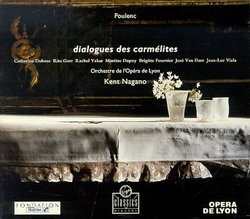| All Artists: Francis Poulenc, Kent Nagano, Catherine Dubosc, Rita Gorr, Rachel Yakar, Martine Dupuy, Brigitte Fournier, José van Dam, Jean-Luc Viala, Orchestre de l'Opéra de Lyon Title: Poulenc - Dialogues des Carmélites / Dubosc, Gorr, Yakar, Dupuy, Fournier, van Dam, Viala, Opéra de Lyon, Nagano Members Wishing: 0 Total Copies: 0 Label: Virgin Classics Release Date: 1/19/1993 Genre: Classical Style: Opera & Classical Vocal Number of Discs: 2 SwapaCD Credits: 2 UPC: 077775922721 |
Search - Francis Poulenc, Kent Nagano, Catherine Dubosc :: Poulenc - Dialogues des Carmélites / Dubosc, Gorr, Yakar, Dupuy, Fournier, van Dam, Viala, Opéra de Lyon, Nagano
 | Francis Poulenc, Kent Nagano, Catherine Dubosc Poulenc - Dialogues des Carmélites / Dubosc, Gorr, Yakar, Dupuy, Fournier, van Dam, Viala, Opéra de Lyon, Nagano Genre: Classical
Poulenc - Dialogues des Carmélites / Dubosc, Gorr, Yakar, Dupuy, Fournier, van Dam, Viala, Opéra de Lyon, Nagano — (View amazon detail page) — ASIN: B000002SRN — Binding: Audio CD — Artist: Francis Poulenc, Kent Naga... more » |
Larger Image |
CD DetailsSynopsis
Product Description Poulenc - Dialogues des Carmélites / Dubosc, Gorr, Yakar, Dupuy, Fournier, van Dam, Viala, Opéra de Lyon, Nagano (View amazon detail page) ASIN: B000002SRN Binding: Audio CD Artist: Francis Poulenc, Kent Nagano, Catherine Dubosc, Rita Gorr, Rachel Yakar, Martine Dupuy, Brigitte Fournier, José van Dam, Jean-Luc Viala, Orchestre de l'Opéra de Lyon UPC: 077775922721 Similarly Requested CDs
|
CD ReviewsMoving performance 06/29/1999 (4 out of 5 stars) "David Patrick Stearns's comment that this recording has a more 'international' flavour than the original one is rather odd, considering that the three performers he singles out - Dubosc, Yakar, and van Dam, are all Francophone singers.This is a fine performance, well-paced and in excellent sound (with the exception of the Old Prioress's death scene, where there are traces of artificial reverberation around Gorr's voice from time to time). The cast all offer committed performances, headed by Dubosc's complex, fragile Blanche, not afraid to be harsh in her first scene with Soeur Constance, and good at conveying the intensity of her fear during her final, desperate scene with Mère Marie. Some of the voices are in something less than perfect shape - Rita Gorr has a few squawky moments, but this is quite in keeping with the character of a dying old woman, and she remains authoritative. Rachel Yakar's Mme. Lidoine is less successful - the voice could do with a bit more weight, and the surprise high notes with which Poulenc tends to break up the vocal line from time to time emerge as yelps. Martine Dupuy successfully brings out Marie's fanaticism.This is a fine recording which cannot fail to move." Generally delightful...until the end. M. Wakefield | 08/22/2005 (4 out of 5 stars) "Honestly, the recording merits somewhere between a 3+ and a four (with no few moments of five-like qualities) in my estimation. The singing on the whole is delightful, with some exceptions (most notably the strained top of both mezzos and Mme Lidoine--which could work in the case of the first prioress, but is for both women at times just unforgivably painful in otherwise beautiful moments of the work. Lidoine does, in the words of another viewer, "yelp" at times. Hence, the three-rating.). That said, much of the singing is beautiful, and Nagano's conducting is intelligent and well balanced (with one notable exception--more forthcoming). Like other reviewers, I, too, performed in this opera and found the recording an accessible one, one that transported me with little difficulty to the heart of the drama. (Albeit, likely aided by my memories of performing.) My major gripe with this recording--and it is major for me, though it may not be for others--is the ending Prelude and Salve Regina. The bass ostinato is just altogether too light--it's easily buried by the other orchestration and by the singers. Consequently, both pieces simply lacked the gritty drive that they require. There's such a tension in the final pieces between the ethereal, angelic quality of the Salve Regina text sung by the nuns and the driving, harsh, almost fatalistic push of the bass line. It just simply isn't in this recording. For me, a strong bass there is essential. The mere sound of an e-g-e bass ostinato is generally enough to make my hair stand on end with all the sound engenders from this opera; on this recording, when the ostinato is in the proper and (for me) original context, the sound is altogether too delicate. Nagano carries me easily to the climax of the opera--and then disappoints. While others may consider the point trivial, I just cannot give the otherwise fine recording five stars. The opera drives so conclusively to that ultimate scene...and then paints only one side of the drama. (Yes, the singing is beautiful. Yes, the nuns do sound like angels. I don't think, however, that angelic beauty is the only thing Poulenc was going for in the scene, however, and this recording doesn't catch the full picture.)" Beautiful! Michael | Washington, D.C. area | 09/07/2004 (5 out of 5 stars) "I first heard DIALOGUES DES CARMELITES on a Metropolitan Opera broadcast. Having already been a Poulenc fan, I naturally fell in love with the opera's lovely musical idiom - French DOUCEUR blended with Stravinskian bite and religious or ecclesiastical elements - before I knew the characters or the details of the plot. While the opera does drag in spots, the electrifying and stoic final scene - in which the laicized nuns are led to the guillotine - more than compensates. DIALOGUES is a refreshing opera, partly because of its story. We can see the "religious intolerance" theme play itself out countless times in plays, movies, etc. It is interesting once in a while to find a story about the opposite evil - secular intolerance towards religion. The DIALOGUES libretto, adapted from a play by French Catholic author Georges Bernanos, imbues a true historical event with contemporary resonance (think of such 20th-century atheistic regimes as Nazi Germany and Stalinist Russia) in a way that reminds me of Miller's THE CRUCIBLE.
There are only two major recordings of this opera: the 1957 version with the original Paris cast, (led by Denise Duval and Regine Crespin), and the present one. I haven't heard the earlier recording, but after hearing the more recent one I would say that we will not be in need of a new version for some time. Kent Nagano makes this music sound positively luminous. Every orchestral color in Poulenc's delicate palette, every note in his harmonically rich, organ-like textures can be clearly heard. (The misty, magical orchestral interludes are truly things to savor in this performance.) Each member of the all-Francophone cast is excellent, right down to the singer portraying the jailer. As the heroine, Blanche, Catherine Dubosc displays a consistently attractive, innocent tone, with a pallor that is appropriate for this character. Rachel Yakar as Madame Lidoine and Martine Dupuy as Mere Marie give strong, declamatory performances - though both singers' high notes sound forced or strained. Michel Senechal has a lovely, nasal tenor voice for the role of the chaplain. One complaint regarding the acoustic: occasionally, voices sound pushed behind the orchestra, rendering them hardly audible. If you would like to experience an accessible, approachable 20th-century opera, look no further than Poulenc's DIALOGUES OF THE CARMELITES." |

 Track Listings (27) - Disc #1
Track Listings (27) - Disc #1

